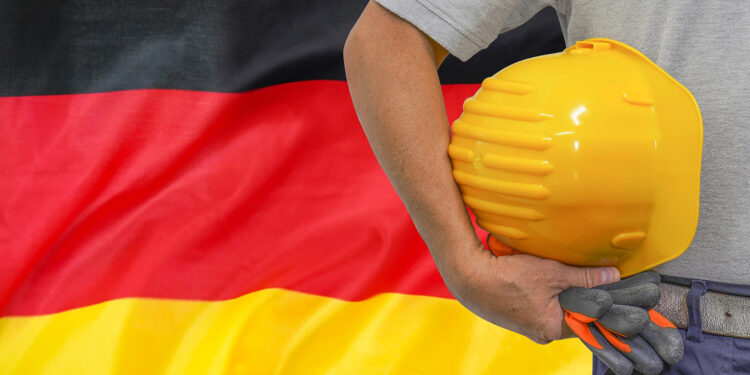The German economy is experiencing a suffocating crisis that has not witnessed since the financial crisis at the beginning of this century, which threatens the internal stability of the largest economy in Europe, especially in light of modest expectations of growth.
The German government indicated that the growth rate may not exceed 0.2% during the year 2025, according to the Ministry of Economy published on its official website. These expectations come in light of internal political turmoil and global geopolitical tensions.
The country’s gross domestic product decreased by 0.2% last year, according to the initial figures issued by the German Federal Statistics Office (Desties), after a contraction of 0.3% in 2023.
Economy at the heart of the election campaign
Economic policy is one of the central issues in the German election campaign, as it has occupied millions of citizens during the past weeks with the approaching elections scheduled for February 23.
Fears are escalating with the continued rise in social security contributions and the increasing cases of corporate bankruptcy, which makes the economic situation more complicated.
https://www.youtube.com/watch?v=hkdts2sf6s0
Challenges of growth and economic shrinkage
The economic shrinkage is due to two main factors, according to Ali Al -Absi, the economic researcher in the German Arab Chamber of Commerce and Industry:
- The first is the interim crises, such as low consumption, decline in exports, and the high cost of energy, which increases production costs in light of severe competition from Chinese industries and others.
- The second factor is the accumulated structural problems, such as the decline in digitization, the deterioration of infrastructure, the enlarged bureaucracy, and high taxes, which causes German companies to invest outside the country instead of developing their production locally.
The German economy is also affected by geopolitical factors, such as the Russian -Ukrainian war, which has made huge amounts of money and slow global demand, which increases the intensity of economic challenges.
Economy stimulation strategies
German parties differ in their vision of the economic crisis solutions. While the Christian Union and the Free Democratic Party focus on eliminating taxes to support investment, the Social Democratic Party and the Green Party count on the proposal to establish a “German Fund” in order to enhance investments.
According to the IFO Institute of Economic Research, the German economy faces major structural challenges, such as the shrinking of the workforce due to the aging of society, the transformation to electrical transmission, the reduction of carbon emissions, and digital transformation, as well as the need to increase spending on security and defense in the shadow of The increasing geopolitical risks.
https://www.youtube.com/watch?v=c-mmeuw6qos
Economic reforms … necessity or adventure?
Al -Absi believes that the solution to the German economy crisis lies in pumping more investments, alleviating tax burdens on companies, improving infrastructure, and promoting digitization.
It is indicated that Germany is late in this field even compared to some developing countries, stressing the importance of raising wages to enhance consumption, which helps in moving the wheel of economic growth.
Is the tax reduction the solution?
The Christian Union and the Free Democratic Party wants to reduce the tax burden on companies to a maximum of 25% and cancel the remaining solidarity tax, in addition to reducing the income tax, especially for low -income people.
On the other hand, the Social Democratic Party and the Greens Party seek to impose higher taxes on the wealthy to finance social spending and investments.
Despite the variation in the proposed solutions, any tax reduction will cost the state treasury billions of euros. The German Economic Institute’s analysis showed that the implementation of the proposals of the Christian Union will reduce the burdens on citizens and companies by about 90 billion euros.
However, the major question mark on how to finance these cuts remain without affecting the stability of public finances.
The future of the German economy … to where?
As the election date approaches, the most important question remains: Can the next government implement real reforms that stimulate growth and avoid the country with a long -term stagnation? Or will interlocking crises make recovery more difficult than expected? Only the political reality after the elections is enough to answer.
According to current opinion polls, the new government is expected to lead the Christian alliance, which includes the Christian Democratic Party, and its younger brother, the Bavarian Christian Social Party.



